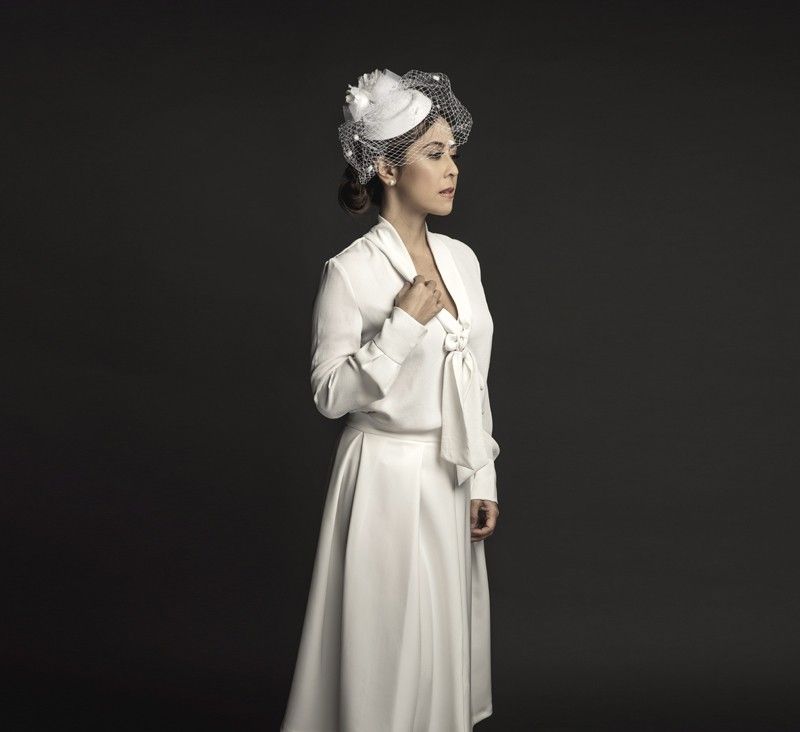Becoming Aurora Quezon

All I could think of was, wow, Aurora was as empowered as a woman could be in the 1930s.
After watching my new movie Quezon’s Game on its opening day, my ever-supportive sister Barni, God bless her heart, posted on social media how much she loved the film. But privately, she messaged me that she thought I was born to play the role of Aurora Quezon. It was clearly meant as a figure of speech because she knows very well that I don’t subscribe to anything being “meant to be.” In fact, I feel worse when as a way of consoling you when you don’t get the outcome that you want, well-meaning people say: “Don’t feel bad. You were meant for something better.” Uh, actually — at least in my experience that isn’t true.
However, in the case of bagging the role of the wife of former President Manuel Quezon, the female lead of such an important Philippine historical film, I have to say that the stars did align. In 2017, Ang Larawan, a film I helped produce and starred in, was released, ending my 20-year hiatus from the silver screen. Earlier that year, I was cast in the musical Monty Python’s Spamalot alongside Dean Rosen, one of the screenplay writers and son of Matthew Rosen, director of Quezon’s Game. Our show had repeat performances the following year, deepening my camaraderie with Dean. Because of that and the fact that I was the right age, he suggested I be considered for the part of Aurora. Naturally, Star Cinema had their own homegrown talents in mind, but after three callbacks — which entailed reading scenes with Raymond Bagatsing, who had already been cast as Manuel Quezon — I was told that the powers that be had acquiesced to Direk Matthew’s decision to give me the role. In my mind, one of the things that likely helped my case is that at the time of the auditions, it didn’t hurt that Ang Larawan was on everyone’s lips and trending on social media.
The moment I heard the good news, I started reading everything I could get my hands on about the former First Lady. By all accounts, she was truly beloved. A school, a boulevard, even a whole province was named after her — not just because of her political status but because of her humanitarian acts and charitable works. She was the first chairperson of the Philippine Red Cross and one of the leaders of the campaign to give Filipino women the right to vote. She was known to be pious and was given a decoration of honor by the Pope. All I could think of as I read all of this information was, wow, Aurora was as empowered as a woman could be in the 1930s.
But who was Aurora — not the president’s wife, nor the public servant, but the person? What were her hopes and dreams? What kind of relationship did she have with her husband and children? What was her demeanor? How did she speak? Unfortunately, unlike how Raymond was able to find online videos of Quezon giving speeches and had the benefit of studying his mannerisms, I could not find video clips or audio recordings of Aurora speaking. I had to fill in the blanks for myself and invent her back-story. And boy, it was daunting to play a real person whose descendants are still around to remember her. It was an enormous responsibility to get it right, and pay a proper tribute to her life.
One of the things I read which gave me insight was the story of how when one of her children died in infancy, Aurora fell into deep despair. Manuel, as his way of comforting his wife, bought a sizable piece of land in Marikina and gave it to her as a present. He knew Aurora always dreamt of leaving city life and returning to a quieter existence. For those who have not seen Quezon’s Game, I won’t put a spoiler here and merely tell you to pay close attention to the scene when that Marikina land title becomes part of the plot. I guarantee you will love the Quezons even more for their selflessness.

“It’s daunting to play a real person whose descendants are still around to remember her.”
The movie has several American characters, such as future President and First Lady of the United States Dwight and Mamie Eisenhower, interacting with the Quezon couple in many scenes. I made the calculation that since Aurora grew up in Tayabas in the late 1800s, she would definitely not sound like the Americans nor like myself and my own theater-trained flat American English accent. Instead, I watched old news clips, listened to how older female politicians spoke and practiced delivering my lines with — as observant movie critic Fred Hawson put it — a “homey, motherly Filipino-English accent.”
But my transformative breakthrough came while we were doing the slide cut, which in filmmaking lingo means camera rehearsals. Direk Matthew and Raymond suggested that, for one of the scenes where the Quezons were arguing, I make my attack less whiny. I had to laugh because I realized I was playing it as Rachel. I whine and cry a lot when fighting with people I love. I had to figure out how to still bring intense, honest emotions into the scene, but as Aurora. Then it hit me: Rachel cries when she feels helplessness and fear. Aurora, on the other hand, is not fearful but not because she is innately strong. Her ultimate source of strength is her great ability to love. And so, from that moment on, before I started any scene, I filled my whole being with only feelings of love. I thought of every person in my life that I care about deeply and let the power of love engulf me. And from there, everything else just naturally flowed. Every line, whether happy, sad or angry — everything I uttered as my character radiated truth. I found my strong yet also vulnerable Aurora.
And what a once-in-a-lifetime opportunity playing this great lady turned out to be. To think, there was a brief moment when I nearly backed out of doing Spamalot. If I had, I would have never encountered Dean Rosen. Hence, I would have never become Aurora. In show business, yes, you need talent, and definitely hard work — but it’s also mostly about who you know.
To be honest, I am very pleasantly surprised at how well Quezon’s Game has been received and reviewed by those who have watched. Not because I had any doubts it would be good but because it’s what you would call a “talkie” film and much of the dialogue is about politics and the imminent Holocaust. And yet almost every person who has seen it, of different ages and backgrounds, has said very similar things: they couldn’t stop crying, not just out of sadness but out of pride to be a Filipino.
One teenager even took to Facebook to say that she typically wouldn’t care to watch a film of this genre. She’s glad she did, and that she gave it a rating of 11/10 as the best movie she has ever watched. My heart pretty much burst when I read that. Talk about feeling hope for our future generation.
The way I think about why I would totally recommend you go see Quezon’s Game while you still can (since the Hollywood blockbusters will likely stick around in cinemas) is this: you probably don’t need to be in the mood to enjoy a cheeseburger and a side order of French fries, right? For most of us, that’s probably appealing anytime. But once in a while, you will have a craving for a really good quality, perfectly cooked steak, the kind that dissolves in your mouth like butter and tastes like a million bucks. Quezon’s Game is that steak and it is food for the soul. Forgive the simplistic food analogy but as a foodie, that’s how my mind works.
So go watch it (if you haven’t already), even just so that, like after finally seeing Avengers: Endgame or Game of Thrones, you can join in the conversation when your friends start talking about it and not feel left out. I guarantee you won’t regret it.















